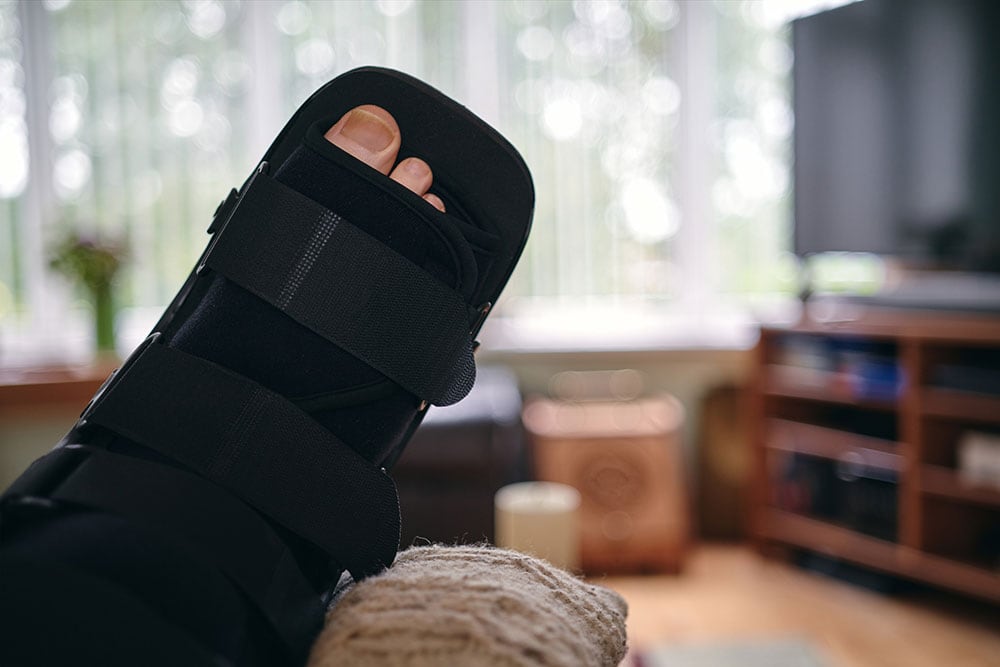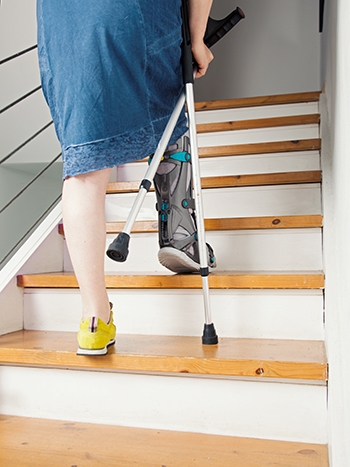
When making your recovery plans for a bunion removal surgery (or bunionectomy) it’s important to know that the type of bunion surgery you undergo will determine the duration of your recovery, as well as your postop limitations.
How long will you need to recover from bunion surgery?
Well, that depends on a number of factors, including what type of bunion correction surgery you have and, of course, how skilled and experienced your surgeon is.
When a bunion (the bony bump by the base of the big toe), also called hallux valgus, is corrected by a traditional open surgery approach, recovery can last10 weeks. Recovery can also involve non-weight-bearing restrictions for up to 4 weeks and require narcotics for pain control.
That is not the case with our state-of-the-art outpatient bunion surgery protocols! Our bunion treatment options require significantly less recovery time than was possible just a couple of years ago.
Lapiplasty® 3D Bunion Correction (which can correct serious to severe bunions, sometimes with a hammertoe), requires significantly reduced recovery time than traditional Lapidus surgeries. Patients usually just need an over-the-counter medication for foot pain. And thanks to our regenerative medicine protocols and extreme care with soft tissues, patients are back to their life—pain-free—in record time.
With Bunionplasty® minimally invasive bunion surgery, recovery is even faster and virtually pain-free.
That’s because the Bunionplasty is done through a tiny one-centimeter incision. Our fixation mechanism is so stable it allows immediate weight-bearing after surgery.
Other advantages of the Bunionplasty are a tiny (or no) scar when healed. Plus, patients can immediately begin exercises for big toe range of motion and physical therapy. Full recovery and return to normal activities (and shoes) are usually accomplished after 4 to 6 weeks.
But no matter what type of bunion surgery you are going to have, it’s a very good idea to take some time before your surgery to prepare your home for a smooth and stress-free recovery. Your feet and peace of mind will thank you.
Our 12 tips to turn your home into the perfect recovery nest

- Consult with your foot surgeon and their staff. They’ll be glad to advise you on everything you’ll need to have at home immediately following foot surgery. Ask your bunion surgeon if you can get any prescriptions in advance so that you can have your medications at hand when you get home on your day of surgery.
- Gather up your resources. Necessities typically include pain relievers, antibiotics, reusable ice packs to reduce swelling, and crutches or other walking aids (if your doctor thinks you will need them).
- Create your recovery zone. For the initial recovery phase, you’ll need to keep your foot elevated as much as possible. So, create a comfortable recovery cocoon with all of the basics you’re going to need. These will include: a comfortable seating arrangement with plenty of supportive pillows and a way to elevate your foot, the TV remote, your phone (and its charger), your laptop, and the virtual library of classics you’ve been meaning to read for years, all within easy reach. Set up a tabletop nearby for your meals and drinks.
- Make your house easy to navigate. Remove any loose rugs or mats. Make sure you have wide navigation paths between your primary recovery zone and your bathroom, kitchen, bedroom, front door, or any other area you may need to access, whether frequently or occasionally.
- Avoid stairs. If your residence has multiple floors, consider staying on the ground level for the first phase of your recovery. Stairways can be annoying, inconvenient, or even dangerous to someone using crutches, wearing a surgical boot, or using a cane.
- Stock up on fresh food and frozen meals. You’re going to want to minimize your trips to the grocery store. So, make sure to cook and freeze meals in advance that you can easily warm up. If you’re a “fresh food or bust” sort, make sure that you have lots of ingredients handy to whip up meals that are quick, easy to prepare, and leave leftovers (to save on cooking later).
- Remind your friends and family how much you love them because you’re going to want to assemble a support network. Be prepared to cash in on all those favors you’ve been earning, if you need them.
- It’s important to stay hydrated, so stash bottles of water in easily reachable locations throughout your snuggery.
- In the early stages of recovery, it’s important to keep inflammation at bay. Ice and cold compresses are helpful in this regard, so having a mini-refrigerator with a functional freezer near your recovery zone can be a lifesaver (or at least an energy saver). If that’s not possible, an ice chest will do.
- You’ll need to keep your foot dry while showering during the first week or so after surgery. Get some sturdy plastic bags large enough to contain the surgical boot protecting your operated foot. Use waterproof tape to seal the bag around your leg above the boot. It may be a good idea to put a plastic chair in the shower! Prolonged standing might not be your favorite pastime during the first couple of weeks after surgery.
- Ask your bunion surgeon for input on the best shoes for bunion surgery recovery. You can bet this information will come in handy after you ween off of your post-op orthotic shoe.
- If your podiatrist prescribes physical therapy, follow the rules and do the work! If your foot doctor orders it, it’s because it’s necessary to preserve big toe joint motion and prevent stiffness. Post-surgical physical therapy can be boring, inconvenient, or sometimes even painful. However, it will be ultimately rewarding when you’re walking pain-free in sandals, showing off your toenails and a great-looking foot!
When to call your bunion surgeon for assistance
Call your doctor is you experience:
- Increasing swelling accompanied by pain.
- Increasing pain not relieved with rest, elevation, ice and the pain medication.
- Coldness, numbness or a sustained blue color to your extremity.
- Sudden onset of calf pain.
- Sudden onset of shortness of breath or chest pain.
Why choose University Foot and Ankle Institute for bunion surgery?
If you’re experiencing bunion pain or any other foot problems, we’re here to help. Our nationally recognized foot and ankle surgeons offer the most advanced foot care and the highest success rates in the nation. We are leaders in the research and treatment of all foot and ankle conditions.
Whether you would like to explore non-surgical treatments or learn about possible surgical procedure options, our board-certified specialists are here to give you their best advice.
For more information or to schedule a consultation with one of our healthcare providers, please call (855) 814-3600 or make an appointment online now.
We are conveniently located throughout Southern California and the Los Angeles area as our foot doctors are available at locations in or near Santa Monica, Beverly Hills, West Los Angeles, Manhattan Beach, Westlake Village, Granada Hills, and Valencia California, to name a few.
- What To Do When Your Toenail Is Falling Off - October 21, 2024
- How To Tell If You Have Wide Feet - October 3, 2024
- 15 Summer Foot Care Tips to Put Your Best Feet Forward - July 1, 2024
Leave a Reply